Related Research Articles

Enron Corporation was an American energy, commodities, and services company based in Houston, Texas. It was founded by Kenneth Lay in 1985 as a merger between Lay's Houston Natural Gas and InterNorth, both relatively small regional companies. Before its bankruptcy on December 2, 2001, Enron employed approximately 20,600 staff and was a major electricity, natural gas, communications, and pulp and paper company, with claimed revenues of nearly $101 billion during 2000. Fortune named Enron "America's Most Innovative Company" for six consecutive years.
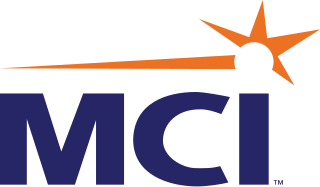
MCI, Inc. was a telecommunications company. For a time, it was the second-largest long-distance telephone company in the United States, after AT&T. WorldCom grew largely by acquiring other telecommunications companies, including MCI Communications in 1998, and filed for bankruptcy in 2002 after an accounting scandal, in which several executives, including CEO Bernard Ebbers, were convicted of a scheme to inflate the company's assets. In January 2006, the company, by then renamed MCI, was acquired by Verizon Communications and was later integrated into Verizon Business.

Gateway, Inc., previously Gateway 2000, Inc., was an American computer company originally based in Iowa and South Dakota. Founded by Ted Waitt and Mike Hammond in 1985, the company developed, manufactured, supported, and marketed a wide range of personal computers, computer monitors, servers, and computer accessories. At its peak in the year 2000, the company employed nearly 25,000 worldwide. Following a seven-year-long slump, punctuated by the acquisition of rival computer manufacturer eMachines in 2004 and massive consolidation of the company's various divisions in an attempt to curb losses and regain market share, Gateway was acquired by Taiwanese hardware and electronics corporation Acer, in October 2007 for US$710 million.
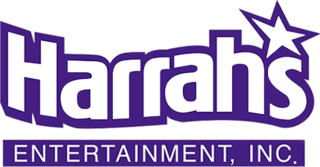
Harrah's Entertainment was an American casino and hotel company founded in Reno, Nevada, and based in Paradise, Nevada, that operated over 50 properties and seven golf courses under several brands. In 2013, it was the fourth-largest gambling company in the world, with annual revenues of $8.6 billion. It was acquired in 2020 by Eldorado Resorts, which then changed its own name to Caesars Entertainment.
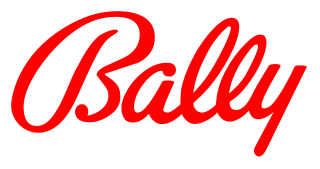
Bally Technologies, Inc. is an American manufacturer of slot machines and other gambling technology based in Enterprise, Nevada. It is owned by Light & Wonder.
Las Vegas Sands Corp. is an American casino and resort company with corporate headquarters in Las Vegas, Nevada, United States. It was founded by Sheldon G. Adelson and his partners out of the Sands Hotel and Casino on the Las Vegas Strip. The Sands was demolished and redeveloped as The Venetian, opening in 1999. An adjacent resort, The Palazzo, opened in 2007. Both resorts were sold in 2022.
Encompass Health Corporation, based in Birmingham, Alabama, is one of the United States' largest providers of post-acute healthcare services, offering both facility-based and home-based post-acute services in 36 states and Puerto Rico through its network of inpatient rehabilitation hospitals, home health agencies, and hospice agencies. Effective January 2, 2018, the organization changed its name to Encompass Health Corporation and its New York Stock Exchange (NYSE) ticker symbol from HLS to EHC.

KTNV-TV is a television station in Las Vegas, Nevada, United States, affiliated with ABC. It is owned by the E. W. Scripps Company alongside Laughlin-licensed independent station KMCC. The two stations share studios on South Valley View Boulevard in the nearby unincorporated community of Paradise ; KTNV-TV's transmitter is located atop Mount Arden in Henderson.
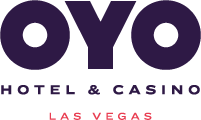
Oyo Hotel & Casino is a casino hotel near the Las Vegas Strip in Paradise, Nevada, United States. It is owned by Highgate and Oyo Hotels & Homes, and its casino is operated by Paragon Gaming. It is located east of the Strip and next to the Tropicana resort. The hotel has 696 rooms with a 30,000-square-foot (2,800 m2) casino.
Securities fraud, also known as stock fraud and investment fraud, is a deceptive practice in the stock or commodities markets that induces investors to make purchase or sale decisions on the basis of false information. The setups are generally made to result in monetary gain for the deceivers, and generally result in unfair monetary losses for the investors. They are generally violating securities laws.
Syntax-Brillian Corporation was an American corporation formed on November 30, 2005, by the merger of Syntax with Brillian Corporation. The company sold HDTVs under the brand name of Ölevia and its stock was previously listed on the Nasdaq Stock Market under the ticker symbol BRLC. It was based in Tempe, Arizona. In 2009, it resolved a bankruptcy proceeding by selling all its assets to Emerson Radio Corp.
China Medical Technologies, Inc. (CMED) was a Cayman Islands corporation based in China, currently in liquidation following fraud allegations. It purported to develop, manufacture, and market advanced in vitro diagnostic ("IVD") products using enhanced chemiluminescence ("ECLIA") technology, fluorescent in-situ hybridization ("FISH") technology, and surface plasmon resonance (“SPR”) technology to detect and monitor various diseases and disorders.
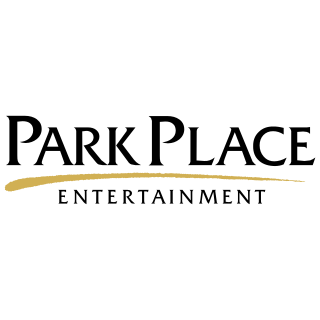
Park Place Entertainment, later named Caesars Entertainment, Inc., was a casino company based in Paradise, Nevada. For a time it was the largest casino operator in the world. It was formed in 1998 as a corporate spin-off of the gaming division of Hilton Hotels, and renamed as Caesars Entertainment in 2003. The company was acquired in 2005 by Harrah's Entertainment, which later took on the Caesars Entertainment name.

Accounting scandals are business scandals which arise from intentional manipulation of financial statements with the disclosure of financial misdeeds by trusted executives of corporations or governments. Such misdeeds typically involve complex methods for misusing or misdirecting funds, overstating revenues, understating expenses, overstating the value of corporate assets, or underreporting the existence of liabilities; these can be detected either manually, or by the means of deep learning. It involves an employee, account, or corporation itself and is misleading to investors and shareholders.
Kaleil Isaza Tuzman is a former entrepreneur associated with digital media, who spent more than 20 years in that industry before being convicted of multiple counts of fraud in 2017. Tuzman started his career at Goldman Sachs, was co-founder of GovWorks.com, served as President of JumpTV, and then as chief executive officer and chairman of KIT Digital, Inc. On September 7, 2015, he was arrested in Colombia and held in a Bogotá prison until being extradited to the United States to face charges of fraud and market manipulation in connection with the defrauding of investors in KIT Digital and two investment funds. He was convicted on all counts in December 2017.
Jumio is an online mobile payment and identity verification company that provides card and ID scanning and validation products for mobile and web transactions, which they sell as "Netverify Trusted Identity as a Service".
The Camelot Hotel/Casino was a proposed hotel and casino that was to be built in the early 1980s in Atlantic City, New Jersey. The site of the proposed project was located in the marina district, adjacent to Harrahs Resort, and was to consist of 990 hotel rooms and a 60,000 sq ft casino. Entertainer Merv Griffin was appointed as entertainment director of the company and planned to broadcast his television show from the hotel. However, because of financial, political and legal difficulties, construction of the hotel/casino was never completed and a casino license was never issued.
Resorts International was a hotel and casino company. From its origins as a paint company, it moved into the resort business in the 1960s with the development of Paradise Island in the Bahamas, and then expanded to Atlantic City, New Jersey with the opening of Resorts Casino Hotel in 1978. After the death of its longtime chairman, James Crosby, in 1986, the company was briefly controlled by Donald Trump, before being acquired by Merv Griffin in 1988. It was acquired by Sun International in 1996.
Bell & Beckwith was a regional stock brokerage firm in Toledo, Ohio, that failed in 1983 as a result of massive fraud. It was the costliest failure for the Securities Investor Protection Corporation (SIPC) at that time.
Nu Ride Inc. is an American electric vehicle automaker located in Lordstown, Ohio. The company was based at the Lordstown Assembly plant, previously a General Motors factory. Lordstown Motors was known for its Lordstown Endurance electric pickup truck. In March 2024, the company emerged from its September 2023 bankruptcy restructuring as Nu Ride Inc., headquartered in New York City.
References
- ↑ Mark Veverka (1999-02-02). "Why Las Vegas' Purchase Pro May Be One Firm Worth Watching:Startup helps hotels make most of their purchases via the Net". San Francisco Chronicle.
- 1 2 Penelope Patsuris (2000-04-07). "Has PurchasePro Bitten Off More Than It Can Chew?". Forbes.
- ↑ "PurchasePro, AOL in B2B venture". Market Watch. 2000-03-20.
- 1 2 3 Kevin Rademacher (2005-01-11). "PurchasePro founder charged". Las Vegas Sun.
- ↑ Alorie Gilbert (2001-04-21). "PurchasePro's Momentum In Question:Reciprocal deals with partners and stock giveaways spur queries on financial figures". Information Week.
- ↑ Mark Lewis (2001-04-25). "Dog Of The Day: PurchasePro.com". Forbes.
- 1 2 3 4 Matthew Barakat (2008-11-14). "Ex-Tech billionaire gets 9 years for stock fraud". Associated Press.
- ↑ George Mannes (2005-01-10). "Two Ex-AOL Execs Charged in PurchasePro Scheme". TheStreet.com.